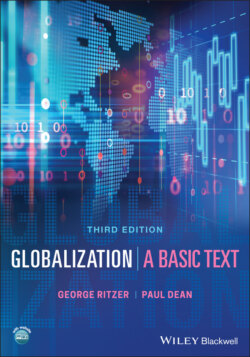Читать книгу Globalization - George Ritzer - Страница 71
POSTCOLONIALISM
ОглавлениеToday, few, if any, colonies remain with the result that we can now think in terms of postcolonialism (Ashcroft 2012b; Mulcahey 2017).4 Clearly, this implies the era in once-colonized areas after the colonizing power has departed (although postcolonial thinking and work could already be well under way before the colonizing power departs). However, in recent years it has come to take on more specific meanings that relate to various developments that take place in a former colony after the colonizing power departs. For example, it relates to a critical issue in globalization studies today, that of national identity, especially the difficulty of gaining identity (as an Indian, for example) after a colonial power (the British in the case of India) has departed. The most notable work on this is Edward Said’s Orientalism (1979/1994: 93) which deals with this problem in the context of both overt and more subtle negative stereotypes developed in the West about those who live in the East. The issue raised is the difficulty experienced by “Orientals” in developing a positive identity in light of all of the negativity about them in the West which, of course, dominated the East in various ways (imperialism, colonialism, etc., until very recently). This negativity is especially clear in the history of Western literature5 (and film) about the East (and, as a result, this issue is of special importance in Edward Said’s field of literary criticism). In fact, it is argued that “postcolonial theory was a creation of literary study” (Ashcroft et al. 2006: 5).
Postcolonial theorists focus on literary texts for several reasons. For one thing, literary texts can be used as a way of exercising cultural control over the “natives” (Janmohamed 2006). For example, textbooks written by the colonial power will reflect its perspective including its right to be in power, its superiority, and the inferiority of the “natives.” For another, those texts can be subverted by those who oppose the colonial power and can be used to help bring down its regime. Finally, knowledge of the importance of texts can lead to new texts that can be used by newly freed colonies to portray themselves positively and to better understand, critique, and overcome the often continuing legacies of postcolonialism. These postcolonial texts can be an important base for the new society created in the aftermath of colonialism.
However, the focus on texts by postcolonial theorists has been criticized on several grounds. For one thing, it is argued that it is mainly Western intellectuals, especially Europeans, who have produced these texts. Postcolonial thinkers are therefore seen as too closely aligned with those who produced the colonial texts that helped enslave the subalterns. That is, postcolonial scholarship is producing what is “at best only a refined version of the very discourse it seeks to displace” (Ashcroft et al. 2006: 11). Furthermore, postcolonialists’ orientation as European, or at least European-trained, scholars has led to work that is produced for other scholars and therefore largely incomprehensible to the native peoples without similar academic training. Finally, their work is seen as far removed from the needs and interests of the native peoples who would be the agents of any movement against colonialism or the legacy of postcolonialism. The work of postcolonialists is seen as quite distant from that of, say, Frantz Fanon (e.g. The Wretched of the Earth [1968]) who wrote in more widely accessible terms and was oriented to practical action to bring down both colonialism and the postcolonial legacy. Thus, many scholars in the field are calling for greater representation from authors of the colonized territories and their descendants (Branche 2018).
